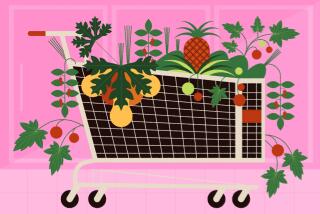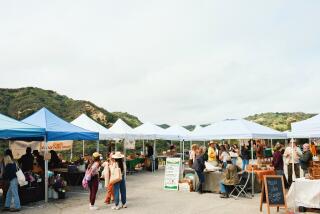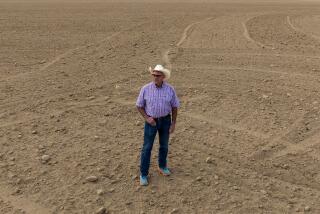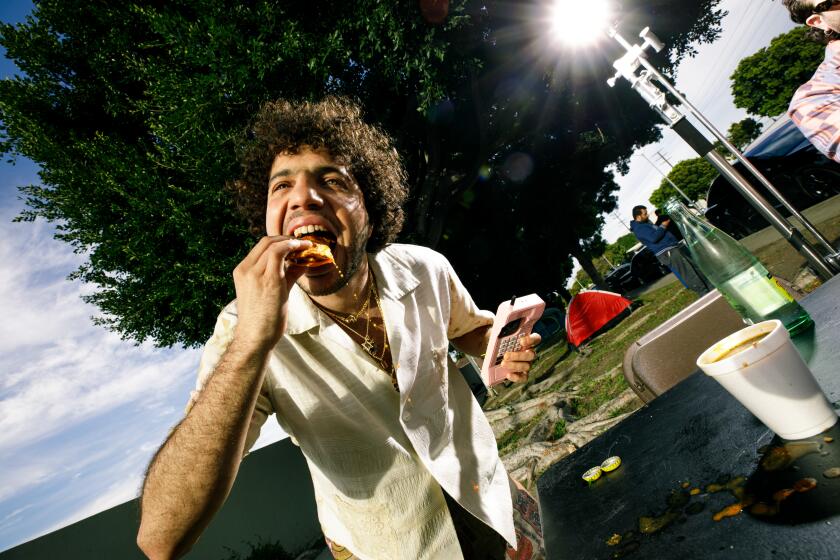Market Watch: Some farmers pulling up stakes
As certified farmers markets have proliferated in recent years, it may appear as if everyone and his uncle is getting into the game. Some vendors indeed are flourishing, but others have been stretched thin by the expansion and resulting dilution of farmers markets. Selling at farmers markets has always involved manifold risks, inefficiencies and frustrations, but in the last year, likely because of the weak economy, quite a few longtime or prominent vendors have withdrawn from the markets or are considering doing so. Each has his own reasons, but together they tell a story: Surviving at farmers markets is increasingly tough for many growers.
When Robert Knight Jr., whose family has grown citrus in the Redlands area since the 1880s, pulled out of his last three farmers markets last year, it was the culmination of a long transition. His father and mother started selling at farmers markets in the late 1970s, when there were just a few, and they did well for many years.
But as they got older — Robert Sr. will be 90 next month, and his son is 53 — they tired of getting up very early to drive long distances through brutal traffic. They dropped out of Santa Monica and Torrance, then Alhambra and Pasadena. Until last spring, father and son sold at three markets in and near Palm Springs, which were easy to get to. But finally the long hours and modest returns persuaded them not to return to farmers markets this season.
“Farmers markets play a wonderful role in the community, but for smaller farmers, the economics can be marginal, like an $8- to $12-an-hour job,” says Robert Jr. “It may keep the farm going, but is not a healthy enough business model to make it thrive; if there are other opportunities out there, you want to find one where your kids maybe might be interested in coming back to farm.”
Eight years ago, to help preserve the historic citrus groves in his area, Knight started the Inland Orange Conservancy, a community-supported agriculture program that supplies citrus from his family’s 14-acre farm and many local growers. Today 90% of his home ranch fruit goes to a farm-to-school program in which he not only sells to local schools but also talks to children about the importance of farms and good nutrition; during his visits he even holds a small informal “farmers market,” giving kids scrip to buy produce.
He loves the original concept of certified farmers markets — farmers selling directly to consumers — but became discouraged by the increasing prevalence of large farms, employees who had little connection with their farms and peddlers who illicitly sold produce bought from other farms or wholesalers.
“Now when you go to a farmers market, it’s almost like a mall experience, where you see the same vendors all over,” he says. “The added value of being small and really local isn’t as important as it used to be.”
Even for large farms, selling at farmers markets is rarely a gold mine. Gless Ranch, which is based in Riverside and grows more than a thousand acres of citrus in the Inland Empire, desert and San Joaquin Valley districts, had been in Southern California farmers markets for several decades. They sold at about 10 venues, including Burbank, Santa Monica and Costa Mesa, and were popular for bargain bags of citrus. So why did they abruptly withdraw last month from all farmers markets?
“It was just economics,” says John Gless Sr., the family patriarch. “It was kind of like a push; we were not losing money but not making much, either. When there were fewer farmers markets, we used to sell more at each one, but now every town has several.”
His company is planning to develop the grove that surrounds its farm stand in Riverside, but it is not clear whether that had anything to do with its withdrawal from farmers markets; Jeff Gless, who managed farmers market sales for the family, declined to comment to The Times.
Generally, vendors are less eager to discuss their reasons for leaving farmers markets than for joining them. Capay Organic, which started and gained a good reputation in Northern California, later expanded production to several growing regions around the state, launched a CSA (community supported agriculture) with tens of thousands of members and started selling at Southern California farmers markets in spring 2010.
Their produce quality was good, but they rubbed some market managers the wrong way by giving the impression that their presence served largely to promote their CSA, which competes with farmers markets. About a month ago, Capay withdrew from its southern markets, for reasons that remain unclear; Jesse Ramer, who manages farmers market operations for the farm, declined to discuss its strategy in detail.
“We haven’t made a full decision,” he did say. “We might be interested in going back to some markets.”
Farmers have always been subject to risks from weather and market prices, and those take their toll on farmers market growers as well. The last several years have been disastrous for Vito Scattaglia, who farms 80 acres of stone fruit and apples in Littlerock, in the high desert, and sold at more than a dozen farmers markets until last year. Like other growers in the area, he lost most of his crop last year to a late spring freeze.
Heavy rains in previous years “ruined me financially,” he says; local prices for water surged to $200 an acre foot, more than twice what his competitors in the San Joaquin Valley are paying; fertilizer costs also skyrocketed; wholesale prices for fruit stayed low; farmers markets “aren’t as busy as they used to be”; and then last year “a monstrous frost killed everything.” As a result, he also lost some of his best workers.
“I have to decide whether to continue farming and selling at farmers markets,” he said. “I’m battling, but I’m not sure yet.”
One of the more unusual exit stories is that of Ibrahim Mesallem of Cali Farms, who recently stopped selling meat at farmers markets to return to his native Libya.
Mesallem, 38, came to the United States at age 6 and became a computer consultant. Living in Venice, he fell in love with farmers markets and started selling grass-fed lamb, beef and goat meat, raised near Stockton by his father, at the Culver City, Mar Vista, Playa Vista and Venice markets.
But within a month, he’ll be flying to Tripoli, where he has family. The prospect is a bit daunting, since he doesn’t have a lot of money and Libya abounds in loose weapons, but he feels it’s the right thing to do.
“My country needs my help, so I’m going back to rebuild, using the knowledge that I learned here in Los Angeles,” he says.
While he enjoyed working at the markets, they were not particularly profitable, he added, so he does not anticipate that his father will hire an employee to sell at farmers markets.
More to Read
Eat your way across L.A.
Get our weekly Tasting Notes newsletter for reviews, news and more.
You may occasionally receive promotional content from the Los Angeles Times.






